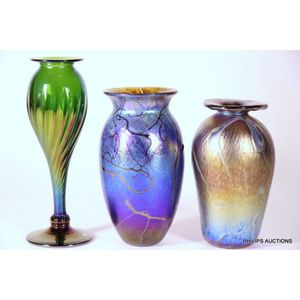Iridescent and Lustre Glass Vases by Heaney and Salton
You must be a subscriber, and be logged in to view price and dealer details.
Subscribe Now to view actual auction price for this item
When you subscribe, you have the option of setting the currency in which to display prices to $Au, $US, $NZ or Stg.
- Bronze - An alloy of copper and tin, traditionally in the proportions of about 9 parts of copper to 1 part of tin.
The discovery of bronze in Western Asia in the 4th century enabled people to create metal objects which were superior to those previoulsy possible because of its strength and hardness, and it has been used throughout the world for weapons, coins, tools, statuary and other decorative items.
It is very fluid in a molten state, and its hardness, strength when set, and non-corrosive properties makes it most suitable for casting sculpture. - Oviform /ovoid - The outline loosely resembling the shape of an egg.
- Irridescent Glass - Iridescent glass has a shimmering or rainbow-like appearance due to the way it reflects light. It is created by applying a thin layer of metal oxides to the surface of the glass while it is still hot and malleable, which then creates an interference effect that produces a range of colours as the light reflects off the surface. The exact colours and patterns created by iridescent glass depend on the specific types of metal oxides used and the techniques used to apply them.
Iridescent glass was first developed in the late 19th century, and quickly became popular for use in decorative art glass and stained glass windows. Some of the most famous examples of iridescent glass were created by artists such as Louis Comfort Tiffany and his studio, who used it extensively in their distinctive lamps, vases, and other decorative objects. - Decor Bois - "Decor bois" is a French term that translates to "wood decor" in English. It refers to decorative elements painted on porcelain items that simulate decorations in timber, such as carvings.
- Circa - A Latin term meaning 'about', often used in the antique trade to give an approximate date for the piece, usually considered to be five years on either side of the circa year. Thus, circa 1900 means the piece was made about 1900, probably between 1895 and 1905. The expression is sometimes abbreviated to c.1900.
This item has been included into following indexes:
Visually similar items

A pair of Royal Doulton Tube-lined stoneware vases, post 1922, with signature of Maude Bowden, stamped X8721Z and 10031, blue mottled glaze baluster vases with waisted necks and a broad frieze of fruiting grapevines in muted purple, blue, amber and light g

A pair of Japanese Meiji period standard cloisonne vases of tapered form with fan panels of flowers on a spiral diaper ground. Height 15 cm

Clarice Cliff 'Delecia' vase 15.5 cm tall

Pair late 19th century Cantonese export vases traditional continuous decoration painted in famille rose palette
